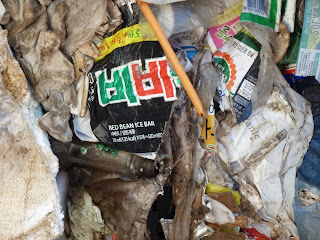Government and Non-Government Organizations to Mark Lead Poisoning Prevention Week
Government and non-government organizations are observing
this year’s International Lead Poisoning Prevention Week of Action with
activities geared at minimizing, if not eliminating, preventable sources of
human exposure to toxic lead.
First held in 2013, the Week of Action, spearheaded by the United Nations Environment
Programme and the World Health Organization, is supported by partners in the
Global Alliance to Eliminate Lead Paint, including the US Environmental
Protection Agency and IPEN (a civil society network for a toxics-free future).
The observance of the Week of Action in the Philippines began yesterday, October 21, at the “Kamayan para sa Kalikasan” Forum organized by the Green Convergence at Kamayan Restaurant in Mandaluyong City that highlighted the concerted efforts to phase out lead-containing architectural, decorative and household (ADH) paints by December 31, 2016 in line with Department of Environment and Natural Resources (DENR) Administrative Order 2013-24.
The observance of the Week of Action in the Philippines began yesterday, October 21, at the “Kamayan para sa Kalikasan” Forum organized by the Green Convergence at Kamayan Restaurant in Mandaluyong City that highlighted the concerted efforts to phase out lead-containing architectural, decorative and household (ADH) paints by December 31, 2016 in line with Department of Environment and Natural Resources (DENR) Administrative Order 2013-24.
Comprising the panelists were government, industry and civil society leaders
representing the key sectors behind the country’s ongoing drive to eliminate
lead paint, including Emmanuelita Mendoza of the DENR - Environmental Management Bureau,
Vergel Dyoco o f the Philippine Association of Paint Manufacturers and Manny
Calonzo of the toxics watch group EcoWaste Coalition.
Tomorrow, October 23, the EcoWaste Coalition and its partner community and
youth groups will hold a “Zombie Run” at Quezon Memorial Circle to dramatize
the need to protect vulnerable groups, particularly children, from lead paint
hazards, as well as to press of industry compliance to the looming phase-out
deadline for leaded ADH paints.
On October 28, the DENR-EMB through its Environmental Education and Information
Division will conduct an orientation seminar
on Lead Poisoning Prevention that is expected to draw attendees from the
academe, non-government organizations and civil society groups.
The said seminar will discuss the dangers of lead and lead compounds, which are
still prevalent in many paint products today, and the steps being undertaken by
the government to address such threats to safeguard public health and the
environment.
“Exposure to lead
poses a significant hazard to human health, especially for children. The health
effects can have a lifelong impact and include damage to body organs,
behavioural problems, and impairment to mental and physical development. WHO lists lead among the top ten chemicals of
public health concern, and all countries should take initiatives to control its
use,” said Dr. Maria Neira, Director of the Department of Public Health, WHO.
“Lead paint, particularly when used in the home, in schools and on toys, is an
important source of lead exposure for children. We know that lead poisoning is
entirely preventable,” the WHO official said in a special statement released
for the Week of Action.
The International Lead Poisoning Prevention Week of Action this year will be
commemorated from October 23 to 29.






Comments